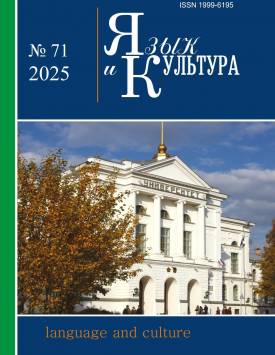Organisation of interpersonal communication in the process of professionally-oriented foreign language training in higher education: experience of introducing the ideas of ethical phenomenology
The relevance of the work is connected with the need to prepare a modern university graduate to participate in international projects to solve professional problems. The language of communication is English as the language of international communication. The conditions of intercultural interaction imply the ability to solve professional tasks in cooperation with people who may differ significantly. Cultural, religious perceptions have an impact on communication and can become an insurmountable barrier in the implementation of professional activities. Responding to the demands of the individual and professional sphere in the training of a university graduate capable of participating in intercultural interaction in the intermediary language, foreign language teaching at the university should be aimed at the formation of professionally oriented intercultural language personality of the learner. The formation of this type of language personality is possible through the professional orientation of foreign language speech activity and involvement of students in acquiring the experience of intercultural interaction. An appeal to the theoretical works devoted to the interaction of people who differ in cultural, religious ideas, representing different points of view, has shown that significant developments in this area belong to the French philosopher Emmanuel Levinas. In his works E. Levinas addresses the problem of cognition of being, the other person and oneself. The author calls the interlocutor the Other with a capital letter, recognises his right to otherness, the possibility of having his own values and ideas. Interaction with the Other should not be reduced to the desire to make him/her the same as you, to find common ground and rely on similarity. The philosopher's ideas are that interaction is realised through difference, which enriches our lives by expanding the ways of seeing the world. The experience of the Other, according to Levinas, should be perceived "in preference", manifesting the ethical component of human society. A necessary component of effective interaction with the Other are acts of solidarity as selfless assistance to the Other. Based on these theoretical provisions, it is possible to apply them to the preparation of students for intercultural interaction through the organisation of interpersonal communication situations in the educational process during classroom work. Interpersonal communication of students should be based on a respectful attitude to the interlocutor, recognition of his/her identity, the right to self-expression and self-realisation. To the knowledge and skills that ensure effective interaction, it is necessary to include scientific knowledge: about the social nature of culture, intersubjective relations through the acceptance of diversity. Overcoming cultural barriers on the basis of scientifically grounded knowledge about the nature of culture ensures the flow of intercultural communication in a rational understanding of differences. In addition to individual characteristics, interests and preferences, the differences between the participants of the study group are due to different levels of language training and the degree of involvement in future professional activities. It is possible to unite the efforts of students when solving tasks in research activities. Working in mini groups to achieve a common goal contributes to the emergence of acts of solidarity, taking into account the differences of participants. The development and organisation of research activities, providing interpersonal interaction of students in the intermediary language, was carried out in the process of foreign language training of students of the aerospace faculty of Perm National Research Polytechnic University. On the basis of the professional standard, the labour functions of a specialist graduate were specified, the problems of professional communication were identified, and professionally oriented content was selected. In order to intensify the foreign language speech activity of students and to provide the experience of interpersonal interaction, all classroom sessions were organised in the form of group work while solving research problems in the intermediate language. Independent work of students was aimed at individual development of skills and abilities of professionally oriented intercultural linguistic personality and was realised with the help of information technologies. In the process of foreign language communication in a group each participant has difficulties, which are related to the difficulty of extracting information from a foreign language text, extracting semantic information, lack of prior knowledge, processing information, correlation of the received information and the task to be solved, structuring and presentation of the message, lack of appropriate vocabulary and grammar, and others. The observation of the group work showed the presence of acts of solidarity in the following cases: providing a model, active listening, distribution of roles according to the needs and interests of the participants, checking and correcting the language design, creative solutions, respectful attitude to the ideas and proposals of all participants, tolerance to interrogations and clarifications, to the language difficulties of the students, understanding of responsibility for their own proposals and attempts to explain their expediency, attempts to explain the reasons, arguments, and the use of the language of the students' own proposals. The selected methodological techniques of organising interpersonal interaction of students in accordance with the stages of solving research problems promoted joint work of students and the emergence of acts of solidarity in the conditions of accepting the differences of interlocutors. The application of E. Levinas's theoretical ideas to the organisation of the educational process in higher education contributes to providing students with a positive experience of interpersonal interaction in the intermediary language. The authors declare no conflicts of interests.
Keywords
professionally oriented intercultural linguistic personality, professional training, E. Levinas' ethics, intercultural communication, interpersonal interaction, intermediary language, interlocutor differences, act of solidarity, group workAuthors
| Name | Organization | |
| Timkina Yuliya Y. | Perm National Research Polytechnic University | timkinaj@mail.ru |
| Alikina Elena V. | Perm National Research Polytechnic University | elenaalikina@yandex.ru |
References

Organisation of interpersonal communication in the process of professionally-oriented foreign language training in higher education: experience of introducing the ideas of ethical phenomenology | Yazyk i Kultura – Language and Culture. 2025. № 71. DOI: 10.17223/19996195/71/10
